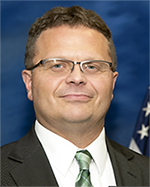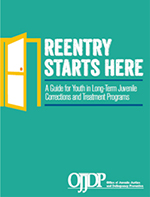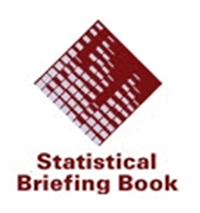Matt M. Dummermuth To Lead Office of Justice Programs
 Matt M. Dummermuth, Principal Deputy Assistant Attorney General, Office of Justice Programs, U.S. Department of Justice.
Matt M. Dummermuth, Principal Deputy Assistant Attorney General, Office of Justice Programs, U.S. Department of Justice.On October 5, 2018, the Department of Justice announced Matt M. Dummermuth as the head of the Office of Justice Programs.
As Principal Deputy Assistant Attorney General, Mr. Dummermuth leads the Justice Department’s principal funding, research, and statistical component, overseeing more than $5 billion in grants and other investments intended to support state, local, and tribal criminal and juvenile justice activities and victim services.
Mr. Dummermuth served as United States Attorney for the Northern District of Iowa from 2007 to 2009. Under his leadership, the office successfully orchestrated the nation’s most successful criminal immigration worksite enforcement action. His office prosecuted record numbers of child exploitation defendants and launched an Internet-predator warning program that reached more than 42,000 students in 150 middle schools. In addition, he created the first human trafficking task force in Iowa.
He previously served in the Justice Department as Counsel and Special Assistant to the Assistant Attorney General for Civil Rights, and as a Special Assistant United States Attorney in the Eastern District of Virginia. Before joining the Office of Justice Programs, Mr. Dummermuth was in private practice in Iowa, where he focused primarily on civil litigation involving constitutional, governmental, agricultural, and business matters.
Blog: How OJJDP Is Supporting Second Chances for Youth
In a blog post titled "OJJDP Provides Second Chance Resources for Youth, Communities," Administrator Caren Harp describes how the Trump administration and OJJDP are working to help youth and their families plan and prepare for reentry so that youth go on to live productive and crime-free lives.
Among other initiatives to reduce recidivism, the blog describes OJJDP’s recently released Reentry Starts Here: A Guide for Youth in Long-Term Juvenile Corrections and Treatment Programs. The guide provides resources that speak to common barriers youth may experience upon reentry and include action steps youth can take to address those barriers. It also includes information on returning to school, applying for housing, gaining employment, and seeking support services.
ICAC Task Force Program Introduces Incident Response Tool for Schools
The OJJDP-supported Internet Crimes Against Children Task Force program has made available a tool that will help schools respond to technology-related incidents. The tool is designed for professionals in education, emergency management, law enforcement, school counseling, and victim services.
This free resource assists schools with the steps of incident management, such as fact-finding, documentation, reporting, and engaging the appropriate school officials and other stakeholders. Through collaboration with law enforcement and the use of this tool, schools can plan and prepare an effective and appropriate response to all types of technology-related incidents.
Comprehensive information about how to use the tool is available in a recorded webinar organized by the OJJDP-supported National Criminal Justice Training Center. The webinar offers guidance on effective technology-related incident planning, the tool’s incident response flowchart and training modules, and the investigation process.
October Is National Substance Abuse Prevention Month
In 2017, more than 72,000 Americans lost their lives to drug overdoses, an increase from the 64,000 overdose deaths in 2016, according to the Centers for Disease Control and Prevention. The majority of these deaths involved opioids. To highlight the need to address these and other serious substance abuse problems, President Donald Trump on September 28, 2018, proclaimed October as National Substance Abuse Prevention Month.
OJJDP will be awarding approximately $33 million in fiscal year 2018 grants to address opioid abuse and other forms of substance abuse. Under the Opioid Affected Youth initiative, OJJDP will award more than $7 million to assist states, local governments, and tribal jurisdictions in developing data-driven responses to opioid abuse. OJJDP will also award $9.75 million to 12 organizations to create and provide mentoring services to children impacted by the opioid epidemic under its Mentoring Opportunities for Youth initiative. In addition, OJJDP will award grants to 20 jurisdictions, totaling more than $12.9 million, under its Drug Treatment Courts program. This program seeks to build the capacity of state, local, and tribal drug court programs for youth in the justice system with substance abuse problems, specifically those related to opioid abuse, as well as those with co-occurring mental health disorders.
OJJDP will award another $1.5 million to the Center for Child and Family Futures to provide training and technical support. The center is recognized as a national expert on developing, implementing, and sustaining collaborative approaches to child welfare- and court-involved families with substance abuse issues. Finally, OJJDP will award more than $1.8 million under its Family Drug Court Research and Evaluation program.
National Public Safety Partnership Holds Symposium To Prevent and Combat Violent Crime
 On September 24–26, the National Public Safety Partnership (PSP) held its 2018 symposium in Birmingham, AL. Established in June 2017 under the direction of Attorney General Jeff Sessions, PSP currently provides a single point of access to a wide array of Department of Justice (DOJ) resources, training, and technical assistance to 21 sites working to reduce violent and other serious crimes related to gangs, guns, and drugs.
On September 24–26, the National Public Safety Partnership (PSP) held its 2018 symposium in Birmingham, AL. Established in June 2017 under the direction of Attorney General Jeff Sessions, PSP currently provides a single point of access to a wide array of Department of Justice (DOJ) resources, training, and technical assistance to 21 sites working to reduce violent and other serious crimes related to gangs, guns, and drugs.
The symposium included individual meetings between representatives from PSP sites and experts on a range of topics, including crime trends, crime statistics, and crime control policy; police and prosecutor partnerships; using crime analysis and data-driven policing; strategies to address crime; and community partnerships and constitutional policing. The symposium also included guided roundtable discussions focusing on the establishment of peer networks for local law enforcement, federal law enforcement, prosecutors, and U.S. Attorneys.
OJJDP has supported PSP through training and technical assistance on juvenile crime and violence prevention, including best practices on gang prevention, intervention, and suppression through the National Gang Center. Cynthia Pappas, OJJDP Senior Policy Advisor, has been working directly with the Birmingham, AL, and Newark, NJ, sites to help them address local juvenile-related crime and violence and to access DOJ programmatic resources. Ms. Pappas also provides resources and guidance to help PSP sites reduce violent crime and increase public safety by exploring new community engagement activities designed to build positive relationships among police and the communities they serve.
Visit the National Public Safety Partnership’s Public Safety Clearinghouse for resources to help reduce violent crime and increase public safety in local communities.
 OJJDP Updates Data Resources on Statistical Briefing Book
OJJDP Updates Data Resources on Statistical Briefing Book
OJJDP has updated its Statistical Briefing Book:
- The Easy Access to Juvenile Populations data analysis tool has been updated to include data through 2017.
- The Easy Access to the FBI’s Supplementary Homicide Reports data analysis tool has been updated to include data through 2016.
- FAQs describing the number, demographics, weapon use, and victim-offender relationship of juvenile homicide victims and juvenile homicide offenders have been updated through 2016.
- FAQs about juvenile suicide victims have been updated to include data through 2016.
- FAQs about self-reported behaviors focusing on weapon carrying and risky driving behaviors reported by high school students have been updated to 2017.
Developed for OJJDP by the National Center for Juvenile Justice, the research division of the National Council of Juvenile and Family Court Judges, the Statistical Briefing Book offers easy online access to statistics on a variety of juvenile justice topics.
NCJRS Releases Special Feature on Campus Safety
The OJJDP-supported National Criminal Justice Reference Service (NCJRS) has released a special feature on campus safety that offers topical information and access to relevant resources on crime and safety as well as substance abuse. Among other trends, the feature notes a 262-percent increase in the number of reported forcible sexual offenses on college campuses from 2001 to 2015. In a study involving 27 universities, more than 23 percent of female students reported unwanted sexual contact. To learn more, read the special feature on the NCJRS website.
Established in 1972, NCJRS offers justice-related information to support research, policy, and program development worldwide. It also provides extensive reference and referral services for justice-related research, policy, and practice. NCJRS houses one of the largest criminal and juvenile justice libraries and databases in the world, the NCJRS Abstracts Database. The database contains more than 225,000 resources, that include statistics, research findings, program descriptions, congressional hearing transcripts, and training materials.
OJJDP Sponsors Monthly Mentoring Webinars
 OJJDP’s National Mentoring Resource Center and MENTOR: The National Mentoring Partnership offer a free webinar each month focused on strengthening mentoring practices, sharing new resources, and helping the field put research into practice.
OJJDP’s National Mentoring Resource Center and MENTOR: The National Mentoring Partnership offer a free webinar each month focused on strengthening mentoring practices, sharing new resources, and helping the field put research into practice.
Webinars are held on the third Thursday of each month. Links to register for an upcoming webinar, with full descriptions and panelist information, are posted during the month leading up to the webinar. Check back periodically as plans for each month are finalized. Past webinars are archived on the National Mentoring Resource Center website. Past webinar topics include supporting and inspiring tribal youth, mentoring youth with disabilities, creating ongoing mentor training, promoting screening practices to ensure safety and the suitability of mentors, and engaging and recruiting mentors.
